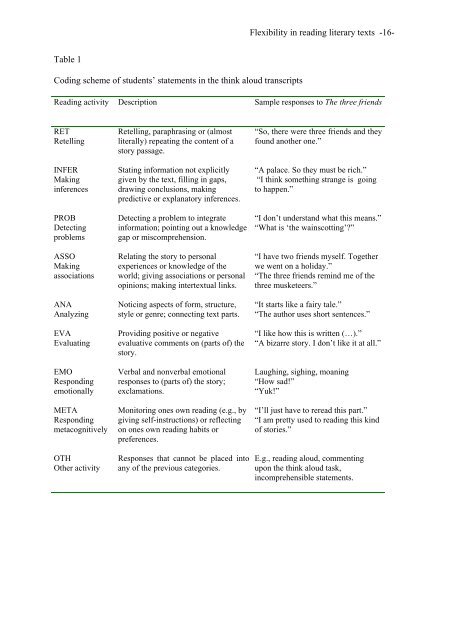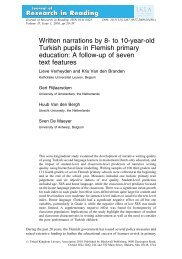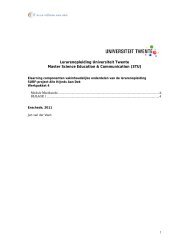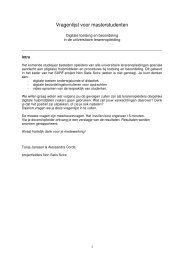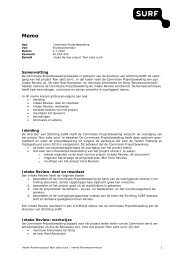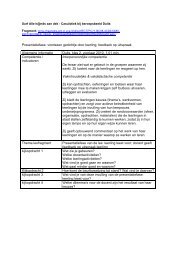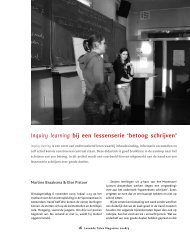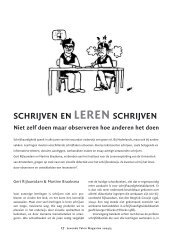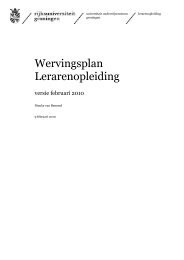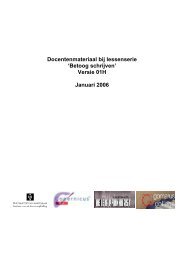Adaptivity in reading literary texts;
Adaptivity in reading literary texts;
Adaptivity in reading literary texts;
You also want an ePaper? Increase the reach of your titles
YUMPU automatically turns print PDFs into web optimized ePapers that Google loves.
Table 1<br />
Cod<strong>in</strong>g scheme of students’ statements <strong>in</strong> the th<strong>in</strong>k aloud transcripts<br />
Read<strong>in</strong>g activity Description<br />
RET<br />
Retell<strong>in</strong>g<br />
INFER<br />
Mak<strong>in</strong>g<br />
<strong>in</strong>ferences<br />
PROB<br />
Detect<strong>in</strong>g<br />
problems<br />
ASSO<br />
Mak<strong>in</strong>g<br />
associations<br />
ANA<br />
Analyz<strong>in</strong>g<br />
EVA<br />
Evaluat<strong>in</strong>g<br />
EMO<br />
Respond<strong>in</strong>g<br />
emotionally<br />
META<br />
Respond<strong>in</strong>g<br />
metacognitively<br />
OTH<br />
Other activity<br />
Retell<strong>in</strong>g, paraphras<strong>in</strong>g or (almost<br />
literally) repeat<strong>in</strong>g the content of a<br />
story passage.<br />
Stat<strong>in</strong>g <strong>in</strong>formation not explicitly<br />
given by the text, fill<strong>in</strong>g <strong>in</strong> gaps,<br />
draw<strong>in</strong>g conclusions, mak<strong>in</strong>g<br />
predictive or explanatory <strong>in</strong>ferences.<br />
Detect<strong>in</strong>g a problem to <strong>in</strong>tegrate<br />
<strong>in</strong>formation; po<strong>in</strong>t<strong>in</strong>g out a knowledge<br />
gap or miscomprehension.<br />
Relat<strong>in</strong>g the story to personal<br />
experiences or knowledge of the<br />
world; giv<strong>in</strong>g associations or personal<br />
op<strong>in</strong>ions; mak<strong>in</strong>g <strong>in</strong>tertextual l<strong>in</strong>ks.<br />
Notic<strong>in</strong>g aspects of form, structure,<br />
style or genre; connect<strong>in</strong>g text parts.<br />
Provid<strong>in</strong>g positive or negative<br />
evaluative comments on (parts of) the<br />
story.<br />
Verbal and nonverbal emotional<br />
responses to (parts of) the story;<br />
exclamations.<br />
Monitor<strong>in</strong>g ones own read<strong>in</strong>g (e.g., by<br />
giv<strong>in</strong>g self-<strong>in</strong>structions) or reflect<strong>in</strong>g<br />
on ones own read<strong>in</strong>g habits or<br />
preferences.<br />
Responses that cannot be placed <strong>in</strong>to<br />
any of the previous categories.<br />
Flexibility <strong>in</strong> read<strong>in</strong>g <strong>literary</strong> <strong>texts</strong> -16-<br />
Sample responses to The three friends<br />
“So, there were three friends and they<br />
found another one.”<br />
“A palace. So they must be rich.”<br />
“I th<strong>in</strong>k someth<strong>in</strong>g strange is go<strong>in</strong>g<br />
to happen.”<br />
“I don’t understand what this means.”<br />
“What is ‘the wa<strong>in</strong>scott<strong>in</strong>g’?”<br />
“I have two friends myself. Together<br />
we went on a holiday.”<br />
“The three friends rem<strong>in</strong>d me of the<br />
three musketeers.”<br />
“It starts like a fairy tale.”<br />
“The author uses short sentences.”<br />
“I like how this is written (…).”<br />
“A bizarre story. I don’t like it at all.”<br />
Laugh<strong>in</strong>g, sigh<strong>in</strong>g, moan<strong>in</strong>g<br />
“How sad!”<br />
“Yuk!”<br />
“I’ll just have to reread this part.”<br />
“I am pretty used to read<strong>in</strong>g this k<strong>in</strong>d<br />
of stories.”<br />
E.g., read<strong>in</strong>g aloud, comment<strong>in</strong>g<br />
upon the th<strong>in</strong>k aloud task,<br />
<strong>in</strong>comprehensible statements.


